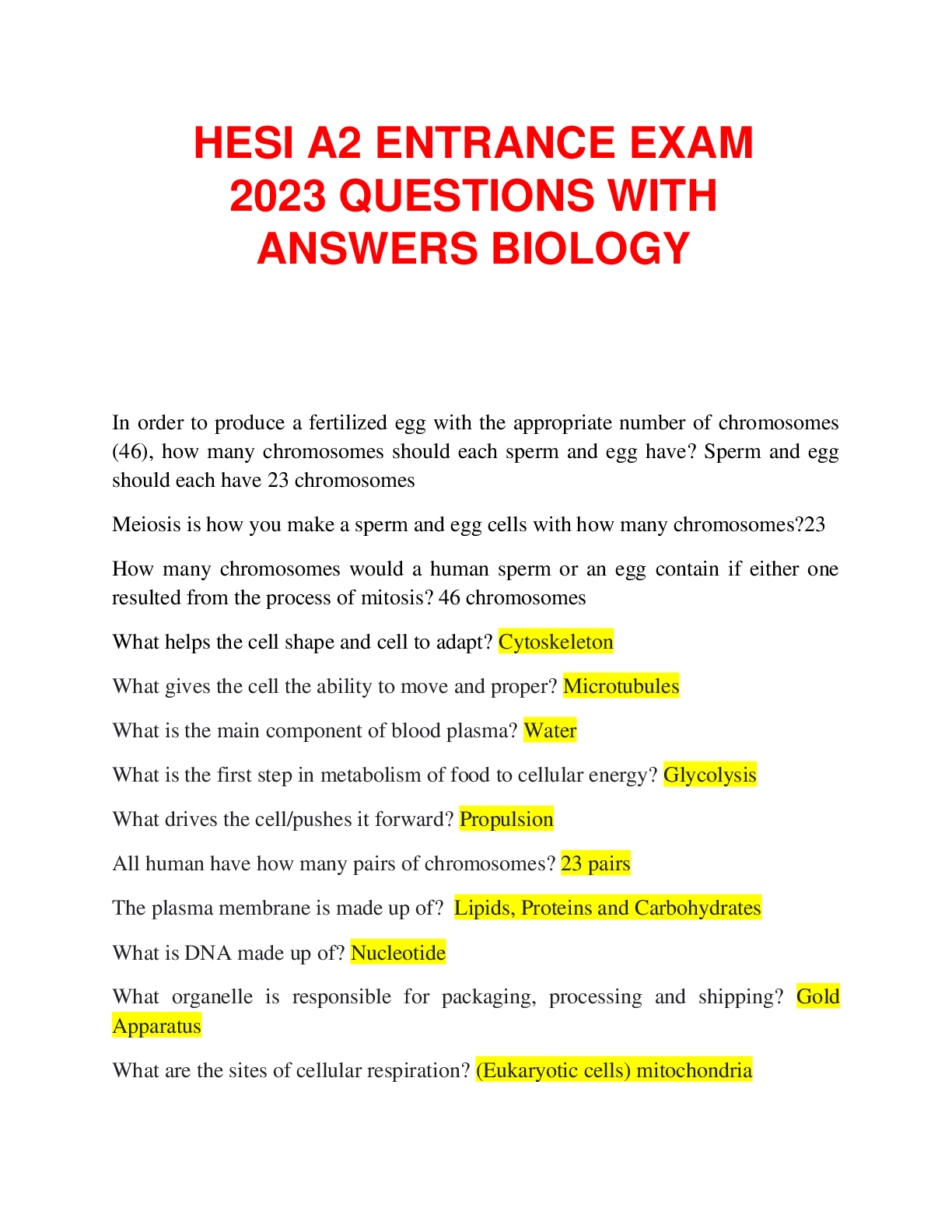
HESI A2 ENTRANCE EXAM 2023 QUESTIONS WITH ANSWERS BIOLOGY
Psychology > QUESTIONS & ANSWERS > FTCE Subject area k-6 Exam Questions and Correct Answers (Verified by Expert) (All)
FTCE Subject area k-6 Exam Questions and Correct Answers (Verified by Expert) How many times does a child have to see a word before it becomes a "sight word?" ✔✔ 14 Christy, a first grade st ... udent, at the beginning of the year picture-reads books. However, by the middle of the year, she was pointing to each word on the page as she reads the book. What concept of print is she exhibiting by the middle of the year? ✔✔ Voice-to-print match Phonemes ✔✔ The smallest units of sounds in spoken words levels for FCAT writing ✔✔ 1-6 primary source ✔✔ -document or physical object which was written or created during the time under study. -first hand testimony or direct evidence concerning a topic under investigation. -either created during time period being studied, or were created at a later date by a participating in the events being studied -reflect individual viewpoint of participant/observer. homophone ✔✔ 2 words are ___________ if they are pronounced the same way but differ in meaning or spelling or both. ex: bare and bear. "accept" vs. "except" ✔✔ ACCEPT-is a verb. it means to take something offered (I accepted his gift) EXCEPT- is a noun. it means to leave out (I want all of those except the blue one). "effect" vs "affect" ✔✔ EFFECT- is a noun. it means intent (the effect of their statement is..) or, something that follows the antecedent (ozone depletion is an effect of...). Phonics ✔✔ involves instruction in how sounds in spoken language are represented by letters in the written language. Phonological Awareness ✔✔ Knowledge of phonological structure of a language- knowledge of individual words in sentences, syllables, and onset-rime segments as well as awareness of individual phonemes in words. Phonemic Awareness ✔✔ most complex level of phonological awareness and involves blending, segmentation, and manipulating individual phonemes. Developmental stages of reading ✔✔ -Global processing -Analytical processing -Approximate to specific linking of sounds with symbols. -Context driven to print driven reading -Awareness of letter sequences, speech sounds, meaning of words. 3 stages of reading ✔✔ 1. Emergent stage 2. Early stage 3. Fluency stage Emergent stage of reading ✔✔ just beginning in terms of reading and writing -starting to learn about basic concepts of print and employ simple reading strategies. -Doing some "pretend reading and simple reading. -should be provided books where text is repetitive and predictable. illustration in books should invite predictions and are supported to the text. Early stage of reading ✔✔ -have a mastery of basic concepts of print. -sight vocab increases and beginning to use various strategies of problem-solving in reading. -books encourage to use wider variety of reading strategies by integrating their sources of info and then search and check for meaning. -books should extend vocab and help master more complex language structures. -illustrations less supportive of story in text. Fluency stage of reading ✔✔ use variety of strategies and gained mastery over concepts of print as well as their reading cueing system. -books should be increasingly complex and deigned for independent reading. cueing systems ✔✔ -syntactic -semantic -graphophonemis Syntactic Cueing System ✔✔ focuses on structure and how language works. might ask a student... does that sentence sound right? Semantic Cueing System ✔✔ focuses on meaning that has become associated with language through prior knowledge and experience. might ask a student...does that make sense? Graphophonemic Cueing System ✔✔ focuses on visual cues and knowledge about sound-symbol system, including phonological awareness and how readers apply this knowledge as they read. might ask a student... does that look right? Different strategies for developing critical thinking skills ✔✔ -knowledge -comprehension -application -analysis -synthesis -evaluation Knowledge ✔✔ -observation and recall of info. -knowledge of dates, events, places -knowledge of major ideas -mastery of subject matter. Question Cues-list, define, tell, describe, identify, name, etc [Show More]
Last updated: 9 months ago
Preview 1 out of 14 pages

Buy this document to get the full access instantly
Instant Download Access after purchase
Buy NowInstant download
We Accept:

Can't find what you want? Try our AI powered Search
Connected school, study & course
About the document
Uploaded On
Jan 04, 2023
Number of pages
14
Written in
All
This document has been written for:
Uploaded
Jan 04, 2023
Downloads
0
Views
189
Scholarfriends.com Online Platform by Browsegrades Inc. 651N South Broad St, Middletown DE. United States.
We're available through e-mail, Twitter, Facebook, and live chat.
FAQ
Questions? Leave a message!
Copyright © Scholarfriends · High quality services·